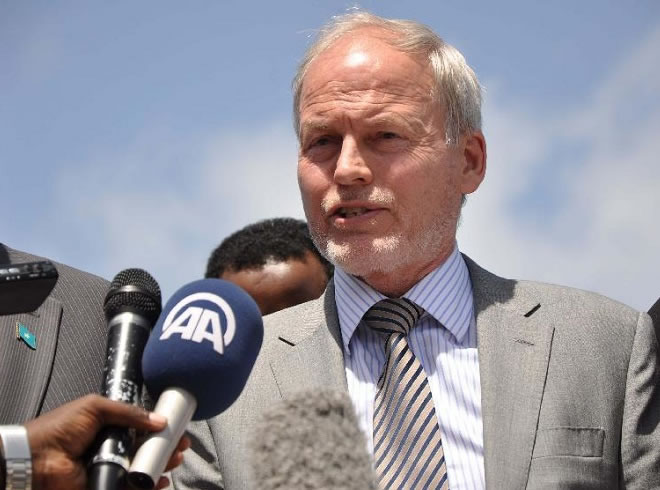
UN Special Representative to Somalia Ambassador Nicholas kay
By Abuwar Awale
Wednesday, September 10, 2014
Dear Ambassador Kay,
In the midst of seemingly endless turmoil in SomalIa, I hope that this letter finds you well. Despite the fact that you are a westerner living in of one of the few almost entirely homogenous societies on earth, your name has become so synonymous with Somali affairs that some have rather amusingly attributed to you the unofficial status of a nabaddoon, which loosely translates community or tribal elder.
The real meaning of the word is peacemaker, which to my mind demonstrates the scale of your achievements in community building and national reconciliation between different groups across Somalia. My previous attempts to communicate my concerns to the numerous leaders of Somalia, Somaliland and Puntland have so far proved futile.
It is for this reason that I have decided to write to you directly for assistance. However, in fairness I have received a positive response from Puntland’s current Minister for Health, Ali Haji Warsame who plans to launch an awareness campaign in primary and secondary schools, a courageous and commendable course of action to deal with a problem that has bedeviled Somalia for so long.
I fully appreciate your time contraints so I will be as concise as possible. You may or may not be aware of the part that I played in the successful campaign to ban khat in the United Kingdom, which formally came in to effect in June of this year.
This was undoubtedly a momentous occasion for the Somali community in Britain and it is my firm belief that this development can only be beneficial for us in terms of further integration into British mainstream society. The khat ban of course brought the UK into line with almost the entire western world, including Holland in recent years, which of course has always been well known for its permissive attitude to recreational drug use. Since the ban became law, the feedback from large setions of our community has been overwhelmingly positive, save for the few individuals whose commercial interests have been adversely affected by it.
However, my efforts to tackle khat and its harmful effects have by no means ended with the UKkhat ban. On the contrary, it has merely emboldened me to export my campaign to Somalia as it is my conviction that khat is one of the major contributors to Somalia’s seemingly endemic, chronic underdevelopment. On closer look, it appears that every facet of daily life in Somalia is in some way, shape or form affected by khat use. People of varying ages feel compelled to consume bundles of this aphetamine-filled leaf for hours and sometimes days on end in order to fill the void of poverty and civil strife with seemingly no end in sight.
You do not need me to tell you that this has catastrophic effects on the mental health of large swathes of the khat-consuming population. To highlight the scale of the problem, a recent UN report concluded that one in three Somalis actually living in Somalia itself could be defined as suffering from some form of mental illness which could demonstrably be linked to khat abuse.
What is also equally alarming is the amount that Somali consumers spend annually on khatimports from Kenya and Ethiopia, which apparently outstrips the entire national budget of Somalia’s federal government twofold. This current state of affairs surely is unsustainable and renders any UN developmental efforts in Somalia somewhat meaningless.
But as a former khataddict myself, I can understand the mental health implications of khat abuse. Having been khat-free for a number of years now, I do feel a degree of personal responsibility to continue campaigning against khat, particularly in Somalia where such efforts are most needed. To this end, in my free time I host a weekly TV chat show purely focussing on this issue on Somali Channel, a privately owned satellite TV station viewed by Somalis in Europe, North America, the Middle East and the Horn of Africa.
While I am grateful to have such an effective platform to preach my anti-khat message, I feel that you as the UN’s special representative to Somalia are better placed to actually take real steps to tackle the problem of khat use and abuse in Somalia, which is by common consent in our society, a catastophe of national proportions as described by none other than President Hassan Sheikh Mohamud in 2013.
Because khat has been woven so deep into the fabric of daily life in Somalia, I do not endorse an immediate blanket ban because the short term effect of this is likely to be counterproductive. I do, however, propose that along with raising awareness, there should be some form of regulation as a first tangible step, the envisaged success of which could conceivably provide a launchpad to banning khat on a step by step basis in the future.
This is incidentally the position of National Authority for the Campaign against Alcohol and Drug Abuse (NACADA ) in Kenya who like myself, have unsurprisingly met vociferous opposition in Meru, Kenya where Khat has been grown and exported to Somalia for many years.
I believe that individuals such as myself whose passionate commitment to combatting khat (which has gone quite some way in mobilising popular support), combined with your political clout as the UN’s Special Representative to Somalia could make some very real, palpable gains in tackling a problem that has proven a scourge on our people for generations and in doing so, removing a huge barrier to Somalia’s long term social, political and economic development.
Please do not hesitate to contact me via my email address should you wish to discuss further.
Yours sincerely
Abukar Awale
[email protected]
Founder and Director of Qaaddiid Foundation
Www.Qaaddiid.com